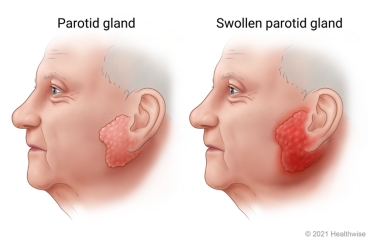
Overview
Parotitis is a swelling of your parotid glands. These are salivary glands located between the ear and jaw. The most common cause is a virus, such as mumps, herpes, or Epstein-Barr. Bacterial infections, diabetes, tumors or stones in the saliva glands, and tooth problems also may cause parotitis.
Follow-up care is a key part of your treatment and safety. Be sure to make and go to all appointments, and call your doctor if you are having problems. It's also a good idea to know your test results and keep a list of the medicines you take.
How can you care for yourself at home?
Here are some ways to take care of yourself:
- Use an over-the-counter pain medicine if needed, such as acetaminophen (Tylenol), ibuprofen (Advil, Motrin), or naproxen (Aleve). Be safe with medicines. Read and follow all instructions on the label. Do not give aspirin to anyone younger than 20. It has been linked to Reye syndrome, a serious illness.
- Use heat on the swollen jaw for 10 to 20 minutes at a time. Put a thin cloth between the heat and your skin.
- To prevent dehydration, drink plenty of fluids. If you have kidney, heart, or liver disease and have to limit fluids, talk with your doctor before you increase the amount of fluids you drink.
- Eat soft foods that don't have to be chewed much.
- If your doctor prescribed antibiotics, take them as directed. Do not stop taking them just because you feel better. You need to take the full course of antibiotics.
- If you think that your medicine is causing a dry mouth, talk to your doctor. Your doctor may change the type or dose of the medicine. Medicines that cause dry mouth include antihistamines, some antidepressants, and some bladder medicines.
- If you have a dry mouth, ask your doctor about using a saliva substitute.
To prevent tooth problems
- Brush and floss every day, and get regular dental checkups.
- If you smoke or use spit tobacco, try to quit. If you can't quit, cut back as much as you can. Tobacco use can interfere with healing. If you need help quitting, talk to your doctor about stop-smoking programs and medicines. These can increase your chances of quitting for good.
When should you call for help?
Call 911 anytime you think you may need emergency care. For example, call if:
- You have trouble breathing.
Call your doctor now or seek immediate medical care if:
- You have new or worse symptoms of infection, such as:
- Increased pain, swelling, warmth, or redness.
- Red streaks leading from the area.
- Pus draining from the area.
- A fever.
- You have new pain, or the pain gets worse.
Watch closely for changes in your health, and be sure to contact your doctor if:
- You do not feel better as expected.
Where can you learn more?
Go to http://www.healthwise.net/patientEd
Enter U528 in the search box to learn more about "Parotitis: Care Instructions".
Current as of: October 27, 2024
Author: Ignite Healthwise, LLC Staff
Clinical Review Board
All Healthwise education is reviewed by a team that includes physicians, nurses, advanced practitioners, registered dieticians, and other healthcare professionals.

